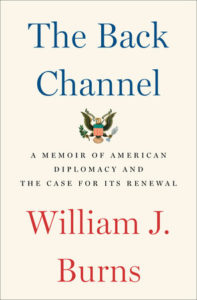 Diplomacy may be one of the world’s oldest professions, but it’s also one of the most misunderstood, says William J. Burns, President of the Carnegie Endowment for International Peace and the author of The Back Channel: A Memoir of American Diplomacy and the Case for Its Renewal. It’s mostly a quiet endeavor, less swaggering than unrelenting, oftentimes operating in back channels, out of sight and out of mind, he writes for Foreign Affairs.
Diplomacy may be one of the world’s oldest professions, but it’s also one of the most misunderstood, says William J. Burns, President of the Carnegie Endowment for International Peace and the author of The Back Channel: A Memoir of American Diplomacy and the Case for Its Renewal. It’s mostly a quiet endeavor, less swaggering than unrelenting, oftentimes operating in back channels, out of sight and out of mind, he writes for Foreign Affairs.
But the hubris and triumphalism of the post-Cold War “Unipolar moment” prompted a debilitating neglect of diplomacy:
The triumphalism of that heady era was nevertheless tempered by some sober realizations. As I wrote in a transition memorandum for incoming Secretary of State Warren Christopher at the beginning of 1993, “alongside the globalization of the world economy, the international political system is tilting schizophrenically toward greater fragmentation.” Victory in the Cold War had stimulated a surge of democratic optimism, but “it has not ended history or brought us to the brink of ideological conformity.” Democracies that failed to produce economic and political results would falter.
And while it was true that for the first time in half a century, the United States didn’t have a global military adversary, it was “entirely conceivable that a return to authoritarianism in Russia or an aggressively hostile China could revive such a global threat,” writes Burns, a board member of the National Endowment for Democracy. RTWT







